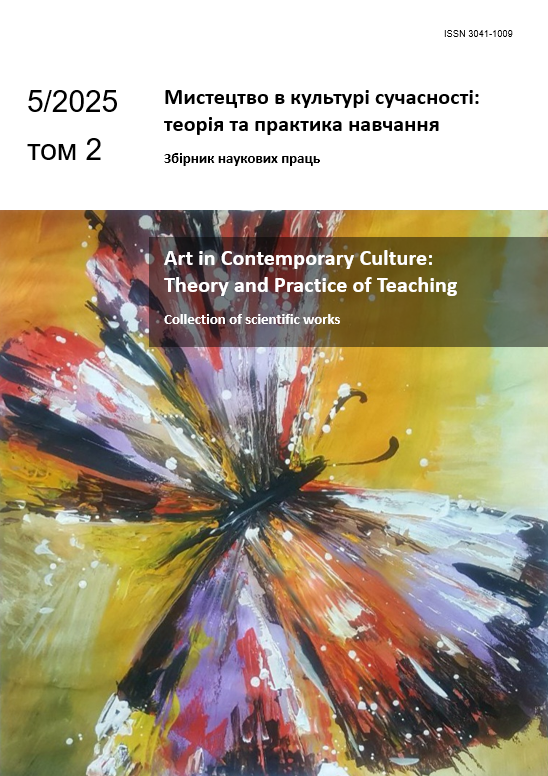Articles
METHODOLOGY FOR THE FORMATION OFMUSICAL ABILITIES OF HIGHER ART EDUCATION STUDENTS IN THE PROCESS OF PIANO TRAINING
Published 2025-12-15
Keywords
- music teacher,
- integrative learning,
- methodology,
- musical ear,
- artistic and expressive thinking
- piano training ...More
Copyright (c) 2025 Наталія Мозгальова

This work is licensed under a Creative Commons Attribution 4.0 International License.
How to Cite
METHODOLOGY FOR THE FORMATION OFMUSICAL ABILITIES OF HIGHER ART EDUCATION STUDENTS IN THE PROCESS OF PIANO TRAINING. (2025). Art in Contemporary Culture: Theory and Practice of Teaching, 6, 96-104. https://doi.org/10.31652/3041-1017-2025(5-2)-28
Abstract
The article, based on the study of the features of musical abilities, proposes some methodological developments regarding their formation in the process of piano training of applicants for higher artistic education. The works of domestic and foreign scientists on this issue are analyzed. The interpretation of the concept of "ability" in various scientific fields is considered: in philosophy - as the ability to successfully, productively act in one or another area of human life; in psychology - as individual psychological characteristics of a person; in pedagogy - as a necessary internal condition for successful activity; in artistic pedagogy - individual psychological properties that are a condition for the perception, performance, creation of music. The main musical abilities include a sense of tone, a musical-rhythmic sense, the ability to auditory representations, musical thinking, and musical memory. It is emphasized that for engaging in musical activity, a complex of musical abilities is necessary, which is called musicality. The main feature of musicality is the ability to experience music and its content. Three types of musicality are considered - intellectual, emotional, creative. Based on the analysis of scientific works, the main types of musical hearing (melodic, harmonic, polyphonic, internal), two main functions of musical hearing, as well as two groups of methods for its development are distinguished. The presence of a musical-rhythmic sense contributes to the understanding of the temporal structure of music and the emotional perception of musical intonations. Developed musical memory contributes to the rapid memorization of musical material, its storage and the most accurate reproduction in performing activities. The specificity of musical thinking lies in the cognition and reflection of reality in musical images. It is emphasized that in the process of piano training of students of higher artistic education, it is necessary to activate different types of thinking - abstract-logical, emotional, artistic-expressive. Methods for the development of musical memory and thinking are presented. One of the means of forming artistic and expressive thinking is recognized as integrated learning methods.Downloads
Download data is not yet available.
References
- Honcharenko S.U. (1997) Ukrainskyi pedahohichnyi slovnyk. 373. [in Ukrainian].
- Hryzohlazova T. I. (2025) Rozvytok muzychnoho slukhu v konteksti fortepiannoi pidhotovky maibutnikh uchyteliv muzychnoho mystetstva. Naukovyi chasopys Ukrainskoho derzhavnoho universytetu imeni Mykhaila Drahomanova. Seriia 14. Teoriia i metodyka mystetskoi osvity. (33), 3-9. [in Ukrainian].
- Hrynchuk I.V., Burska O. P. (2008) Problemy muzychnoho myslennia: teoriia metodyka rozvytku. Dialektyka muzychnoho lohosu ta eidosu: navch.-metodychnyi posibnyk. 224. [in Ukrainian].
- Husak V. (2006) Osoblyvosti rozvytku rukhovoi pamiati v protsesi profesiinoi pidhotovky vchytelia muzyky. Psykholoho-pedahohichni problemy silskoi shkoly. 71–80. [in Ukrainian].
- Ekonomova, O.S, Harkusha L.I. (2022) Formuvannia ta rozvytok muzychnoho slukhu v profesiinomu rozvytku studenta-pianista. Naukovi zapysky. Seriia. Pedahohichni nauky. (153), 50-56. [in Ukrainian].
- Kostiuk, H.S. (1963) Zdibnosti ta yikh rozvytok u ditei. 80. [in Ukrainian].
- Kremeshna, T.S. (2012) Muzychne myslennia yak faktor profesiinoho stanovlennia maibutnikh uchyteliv muzyky. Problemy pidhotovky suchasnoho vchytelia. (6 (2), 140–144. [in Ukrainian].
- Li Khuifan.(2023) Rozvytok muzykalnosti molodshykh shkoliariv u protsesi fortepiannoho navchannia v pozashkilnykh zakladakh mystetskoi osvity. Dysertatsiia na zdobuttia stupenia doktora filosofii zi spetsialnosti 014 Serednia osvita (muzychne mystetstvo). 255. [in Ukrainian].
- Moskvichova Yu. O. (2022) Pedahohichni umovy rozvytku muzychnoho myslennia studentiv-pianistiv. Filosofiia kulturno-mystetskoi osvity 131-135. [in Ukrainian].
- Naumenko S. I. (2015) Psykholohiia muzychnoi diialnosti. Chernivtsi: PP Vydavnychyi dim «Rodovid», 408. https://fm.udu.edu.ua/kafedr/s-ainmenu-21/naumenko-svitlana-ivanivna [in Ukrainian].
- Rohoza O.S. (2011) Metodyka rozvytku muzychnoho myslennia molodshykh shkoliariv u protsesi navchannia hry na hitari. avtoref. dysertatsii na zdobuttia naukovoho stupenia kandydata pedahohichnykh nauk. 215. [in Ukrainian].
- Tarkivska-Nahynaliuk O. D. (2021) Pedahohichni umovy rozvytku metrorytmichnoho chuttia maibutnikh uchyteliv muzyky v protsesi fakhovoi pidhotovky. Dysertatsiia na zdobuttia naukovoho stupenia kandydata pedahohichnykh nauk. 224. [in Ukrainian].
- Filosofskyi entsyklopedychnyi slovnyk. (2002). 742. [in Ukrainian].
- Vidor, D. (1926). Was ist musikalisch. [in Germany].
- Seashore, C. (1938). The Psychology of Musical Talent. [in in England].
- Revesz, G. (1925). The psychology of a musical prodigy, Kegan Paul, Trench & Trubner.. [in England].
- Weliek, A. (1963). Musik Psychology und Musikasthetik. [in Germany]..




